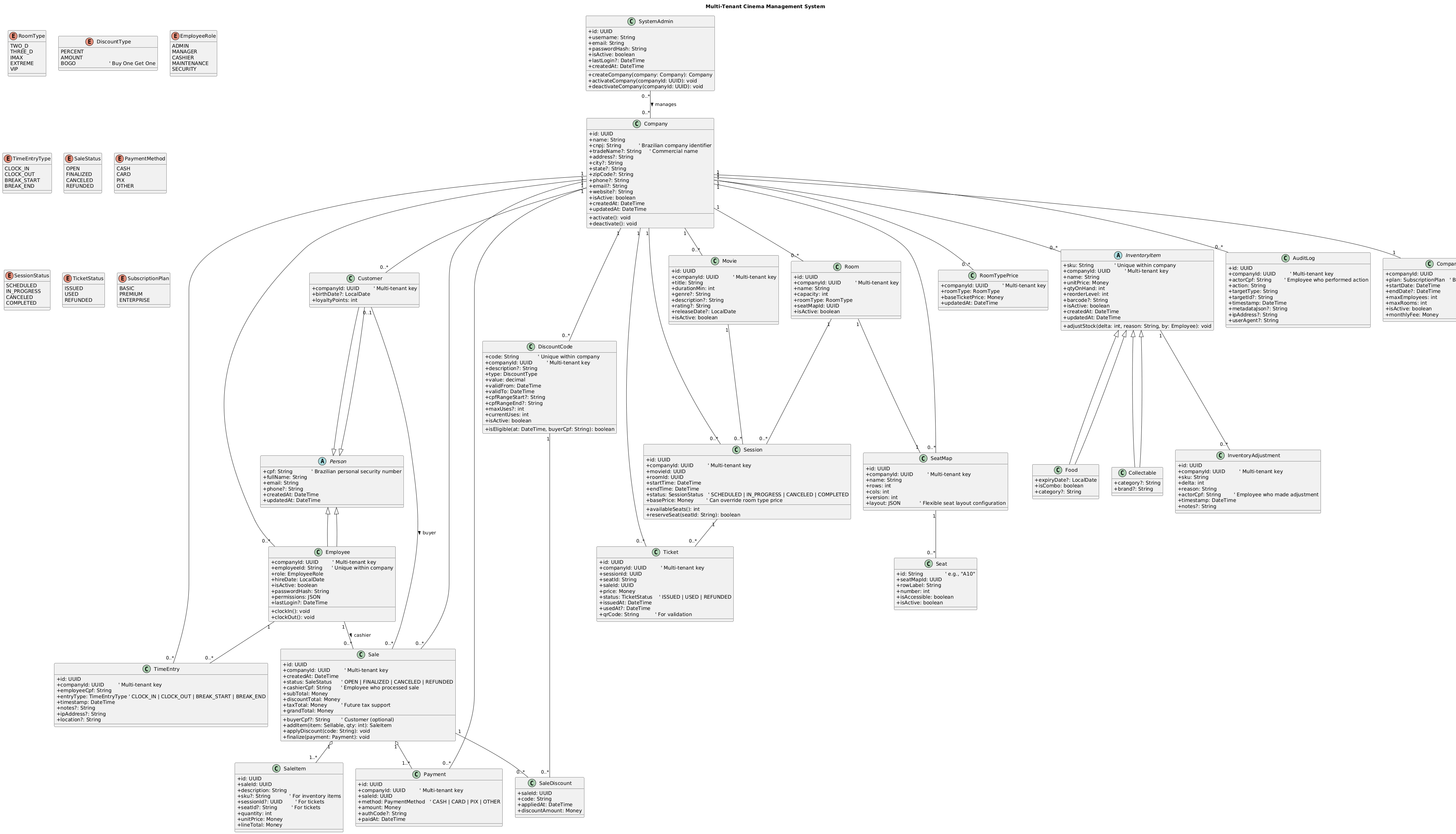Multi-Tenant Classes Diagram Overview
This document describes the main classes, enums, and relationships of the Multi-Tenant Cinema Management System. It summarizes the UML class diagram into a readable reference.
1. Multi-Tenant Core Classes
Company
- ID:
id(UUID) - Fields:
name,cnpj,tradeName?,address?,city?,state?,zipCode?,phone?,email?,website?,isActive,createdAt,updatedAt - Methods:
activate(),deactivate() - Purpose: Central tenant entity that owns all business data. Each company operates as an isolated tenant.
SystemAdmin
- ID:
id(UUID) - Fields:
username,email,passwordHash,isActive,lastLogin?,createdAt - Methods:
createCompany(),activateCompany(),deactivateCompany() - Purpose: Cross-tenant administrators who can manage multiple companies and platform-wide operations.
CompanySubscription
- ID:
companyId(UUID) - Fields:
plan,startDate,endDate?,maxEmployees,maxRooms,isActive,monthlyFee - Purpose: Defines subscription limits and billing for each company tenant.
2. People & Roles
Person (abstract)
- ID:
cpf(Brazilian personal security number) - Fields:
fullName,email,phone?,createdAt,updatedAt - Purpose: Base class for all people in the system.
Customer (extends Person)
- ID:
[cpf, companyId](Compound primary key) - Fields:
companyId(UUID),birthDate?,loyaltyPoints - Notes: Scoped to company. Used when a sale must record buyer info (especially for discounts).
Employee (extends Person)
- ID:
[cpf, companyId](Compound primary key) - Fields:
companyId(UUID),employeeId,role,hireDate,isActive,passwordHash,permissions,lastLogin? - Methods:
clockIn(),clockOut() - Purpose: Company-scoped staff that can make sales or stock adjustments. Authentication includes company context.
TimeEntry
- ID:
id(UUID) - Fields:
companyId(UUID),employeeCpf,entryType,timestamp,notes?,ipAddress?,location? - EntryType:
CLOCK_IN,CLOCK_OUT,BREAK_START,BREAK_END - Purpose: Tracks employee work hours and break times within each company.
3. Movies, Rooms, and Sessions
Movie
- ID:
id(UUID) - Fields:
companyId(UUID),title,durationMin,genre?,description?,rating?,releaseDate?,isActive - Notes: Company-scoped movies. Each company manages its own movie catalog.
Room
- ID:
id(UUID) - Fields:
companyId(UUID),name,capacity,roomType,seatMapId,isActive - Methods:
getSeatMap() - Notes: Company-scoped rooms with seat maps and room types (2D, 3D, IMAX, EXTREME, VIP).
RoomTypePrice
- ID:
[companyId, roomType](Compound primary key) - Fields:
companyId(UUID),roomType,baseTicketPrice,updatedAt - Purpose: Company-specific pricing for different room types. Allows each tenant to set their own ticket prices.
SeatMap
- ID:
id(UUID) - Fields:
companyId(UUID),name,rows,cols,version,layout(JSON) - Methods:
findSeat(id),allSeats() - Relations: Owns many
Seat - Purpose: Company-scoped seat layout configuration with flexible JSON-based seat arrangements.
Seat
- ID:
id(e.g. "A10") - Fields:
seatMapId,rowLabel,number,isAccessible,isActive - Purpose: Individual seats within a seat map. Not directly tenant-scoped (scoped through SeatMap).
Session
- ID:
id(UUID) - Fields:
companyId(UUID),movieId,roomId,startTime,endTime,status,basePrice - Methods:
schedule(),start(),cancel(),complete(),availableSeats(),reserveSeat(seatId) - Relations: Belongs to one
Movieand oneRoom, issues manyTickets - Purpose: Company-scoped movie showings with pricing and seat management.
Ticket
- ID:
id(UUID) - Fields:
companyId(UUID),sessionId,seatId,saleId,price,status,issuedAt,usedAt?,qrCode - Status:
ISSUED,USED,REFUNDED - Purpose: Company-scoped ticket for specific seat and session with QR code for validation.
4. Inventory & Stock
InventoryItem (abstract)
- ID:
[sku, companyId](Compound primary key) - Fields:
companyId(UUID),sku,name,unitPrice,qtyOnHand,reorderLevel,barcode?,isActive,createdAt,updatedAt - Methods:
adjustStock(delta, reason, by),decrement(),restock() - Purpose: Company-scoped base class for sellable physical goods.
Food (extends InventoryItem)
- Fields:
expiryDate?,isCombo,category? - Purpose: Food and beverage items with expiration tracking.
Collectable (extends InventoryItem)
- Fields:
category?,brand? - Purpose: Merchandise and collectible items.
InventoryAdjustment
- ID:
id(UUID) - Fields:
companyId(UUID),sku,delta,reason,actorCpf,timestamp,notes? - Purpose: Company-scoped log of every stock change for audit trail.
5. Sales / POS
Sale
- ID:
id(UUID) - Fields:
companyId(UUID),createdAt,status,cashierCpf,buyerCpf?,subTotal,discountTotal,taxTotal,grandTotal - Status:
OPEN,FINALIZED,CANCELED,REFUNDED - Methods:
setBuyer(),addItem(),applyDiscount(),computeTotals(),finalize(),cancel() - Relations: Has many
SaleItem,Payment, and appliedDiscountCode - Purpose: Company-scoped point-of-sale transactions with employee tracking.
SaleItem
- ID:
id(UUID) - Fields:
companyId(UUID),saleId,description,sku?,sessionId?,seatId?,quantity,unitPrice,lineTotal - Methods:
recalc() - Purpose: Individual line items in a sale, supporting both inventory items and tickets.
Payment
- ID:
id(UUID) - Fields:
companyId(UUID),saleId,method,amount,authCode?,paidAt - Method:
CASH,CARD,PIX,OTHER - Purpose: Company-scoped payment records for sales.
SaleDiscount
- ID:
[saleId, code](Compound primary key) - Fields:
saleId,code,appliedAt,discountAmount - Purpose: Junction table linking sales to applied discount codes with applied amounts.
6. Discounts
DiscountCode
- ID:
[code, companyId](Compound primary key) - Fields:
companyId(UUID),code,description?,type,value,validFrom,validTo,cpfRangeStart?,cpfRangeEnd?,maxUses?,currentUses,isActive - Type:
PERCENT,AMOUNT,BOGO(Buy One Get One) - Methods:
isEligible(at, buyerCpf) - Relations: Applied to
SalethroughSaleDiscount - Purpose: Company-scoped discount codes with usage tracking and eligibility rules.
7. Auditing & Reporting
AuditLog
- ID:
id(UUID) - Fields:
companyId(UUID),actorCpf,action,targetType,targetId?,timestamp,metadataJson?,ipAddress?,userAgent? - Relations: Linked to actions on
Sale,InventoryItem,Session, etc. - Purpose: Company-scoped audit trail for employee actions and system events.
PricingService
- Method:
priceFor(roomType) - Purpose: Get base ticket prices from
RoomTypePrice.
SalesReportService
- Methods:
salesByEmployee(from, to)stockValuation()topProducts(limit, from, to)
8. Enums
- EmployeeRole:
ADMIN,MANAGER,CASHIER,MAINTENANCE,SECURITY - TimeEntryType:
CLOCK_IN,CLOCK_OUT,BREAK_START,BREAK_END - SaleStatus:
OPEN,FINALIZED,CANCELED,REFUNDED - PaymentMethod:
CASH,CARD,PIX,OTHER - SessionStatus:
SCHEDULED,IN_PROGRESS,CANCELED,COMPLETED - RoomType:
TWO_D,THREE_D,IMAX,EXTREME,VIP - DiscountType:
PERCENT,AMOUNT,BOGO - TicketStatus:
ISSUED,USED,REFUNDED - SubscriptionPlan:
BASIC,PREMIUM,ENTERPRISE
9. Relationships (Highlights)
Multi-Tenant Core
- Company → All Business Entities: Every business entity includes
companyIdfor complete data isolation - SystemAdmin → Company: Cross-tenant administrators can manage multiple companies
- Company → CompanySubscription: One-to-one relationship defining tenant limits and billing
Business Entity Relationships
- Person hierarchy:
Customer,Employeeboth extendPersonwith company scoping - Employee → TimeEntry: Employees track work hours within their company
- Movie → Session → Ticket: Company-scoped movie scheduling and ticketing workflow
- Room → Session: Company rooms host sessions, room type defines tenant-specific pricing
- SeatMap → Seat: Company-scoped seat layout management
- Sale → SaleItem, Payment, SaleDiscount: Company-scoped POS with multi-tenant discounts
- InventoryItem → Food/Collectable: Company-specific inventory with stock tracking
- InventoryAdjustment: Company-scoped audit trail for stock changes
- AuditLog: Complete activity tracking within company boundaries
Data Isolation
- All compound primary keys include
companyIdwhere applicable (Customer, Employee) - Foreign key relationships respect tenant boundaries
- Cross-tenant access only available to SystemAdmin role
